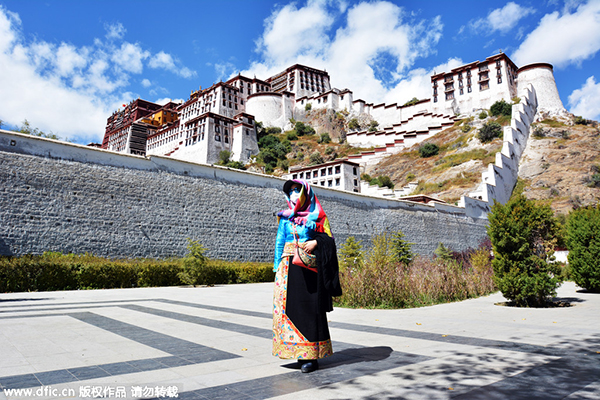The real Tibet as seen by impartial visitors
(China Daily) Updated: 2016-07-27 07:53
 |
|
A woman dressed in Tibetan costume poses for photos in front of the Potala Palace in Lhasa, southwest China's Tibet autonomous region, Oct 10, 2014. [Photo/IC] |
Editor's note: Over 130 scholars, officials and correspondents from more than 30 countries and regions attended the 2016 Forum on the Development of Tibet in Lhasa, which was hosted by the State Council Information Office and the regional government, on July 7. Following are excerpts from the comments made by some of the attendees:
Tibetan Buddhism has reached its prime, ushering in unprecedented opportunities and all the conditions needed to adapt to socialist society. These opportunities and conditions fall under six categories-social system, freedom of belief, integration of traditional Chinese and religious cultures, monastery management, religious content and cultivation of Tibetan Buddhist talents. Tibetan Buddhism must lay greater emphasis on talent cultivation and self-construction, for it can prosper only by adapting to socialist society.
Drukhang Tubdain Kaizhub, vice-president of Chinese people's political consultative conference in the Tibet autonomous region.
Tibet has become a gateway to the Belt and Road Initiative. As such, it should make the green concept and sustainable development its guiding principle to avoid the damage caused by the creative process. This would help build a green Tibetan autonomous region. During development, it is necessary to protect Tibet's environment not only through preservation of the ecology and eco-friendly growth, but also by protecting nature and biodiversity, in order to allow nature to flourish.
Leung In Sing, president of the Cultural Regeneration Research Society in Canada.
- Monks attend Sur offering ritual in Zhaxi Lhunbo Monastery in Tibet
- China's Tibet comes on top of regional GDP growth in H1
- Panchen Lama's teaching praised at Tibet ritual
- Devotees seek light, wisdom in Tibet
- Throngs seek light, wisdom in Tibet
- Panchen Lama leads first Kalachakra ritual in Tibet in 50 years
- Tibet avalanche was glacier slide
- Foreign experts marvel at rapid development of Tibet












